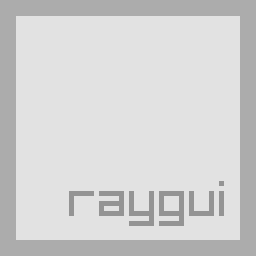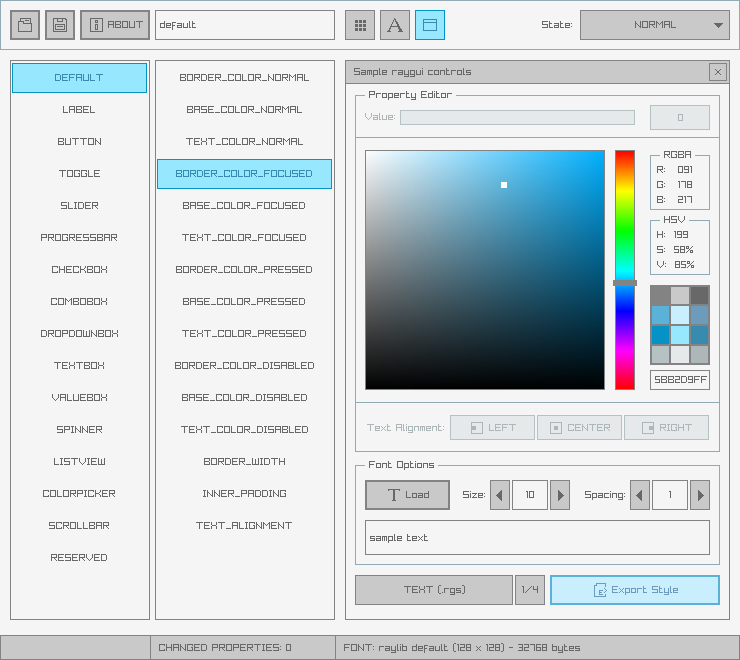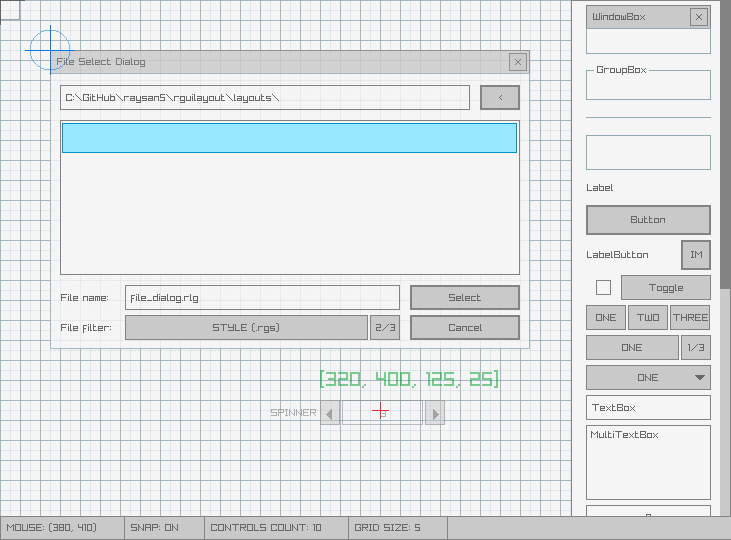4.2 KiB

raygui is a simple and easy-to-use immediate-mode-gui library.
raygui was initially inspired by Unity IMGUI (immediate mode GUI API).
raygui was originated as an auxiliar module for raylib to create simple GUI interfaces using raylib graphic style (simple colors, plain rectangular shapes, wide borders...).
raygui is intended for tools development; it has already been used to develop multiple publised tools.
features
- Immediate-mode gui, no retained data
- +28 basic and advance controls provided
- Powerful styling system for colors, font and metrics
- Standalone usage mode supported (for other graphic libs)
- Icons support, embedding a complete 1-bit icons pack
- Multiple tools provided for raygui development
raygui controls
basic controls
Label | Button | LabelButton | ImageButton | Toggle | ToggleGroup | CheckBox
ComboBox | DropdownBox | TextBox | TextBoxMulti | ValueBox | Spinner | Slider
SliderBar | ProgressBar | StatusBar | ScrollBar | ScrollPanel | DummyRec | Grid
advance controls
ListView | ColorPicker | MessageBox | TextInputBox
container/separator controls
WindowBox | GroupBox | Line | Panel
raygui styles
raygui comes with a default style automatically loaded at runtime:
Some additional styles are also provided for convenience, just check styles directory for details:
Custom styles can also be created very easily using rGuiStyler tool.
Styles can be loaded at runtime using raygui GuiLoadStyle() function. Simple and easy-to-use.
raygui icons
raygui supports custom icons provided as an external array of data. To support icons just define RAYGUI_SUPPORT_RICONS before including raygui.
A set of custom handcrafted icons is provided in ricons. This set of icons can be created and customized using rGuiIcons tool.
#define RAYGUI_IMPLEMENTATION
#define RAYGUI_SUPPORT_RICONS
#include "raygui.h"
To use any of those icons in your gui, just preprend iconId to any text written within raygui controls:
if (GuiButton(rec, "#05#Open Image")) { /* ACTION */ }
or use the provided GuiIconText() function to prepend it automatically, using a clearer identifier.
if (GuiButton(rec, GuiIconText(RICON_FILE_OPEN, "Open Image"))) { /* ACTION */ }
raygui support tools
-
rGuiStyler - A simple and easy-to-use raygui styles editor.
-
rGuiIcons - A simple and easy-to-use raygui icons editor.
-
rGuiLayout - A simple and easy-to-use raygui layouts editor.
building
raygui is intended to be used as a portable single-file header-only library, to be directly integrated into any C/C++ codebas but some users could require a shared/dynamic version of the library, for example, to create bindings. raygui can be built as a (Linux) shared library using:
- Windows (MinGW, GCC)
copy src/raylib.h src/raylib.c
gcc -o src/raygui.dll src/raygui.c -shared -DRAYGUI_IMPLEMENTATION -DBUILD_LIBTYPE_SHARED -static-libgcc -lopengl32 -lgdi32 -lwinmm -Wl,--out-implib,src/librayguidll.a
- Linux (GCC)
mv src/raygui.h src/raygui.c
gcc -o raygui.so src/raygui.c -shared -fpic -DRAYGUI_IMPLEMENTATION -lraylib -lGL -lm -lpthread -ldl -lrt -lX11
license
raygui is licensed under an unmodified zlib/libpng license, which is an OSI-certified, BSD-like license that allows static linking with closed source software. Check LICENSE for further details.



